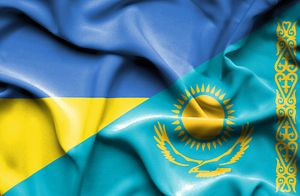In the first eight months of 2016, 143 train cars laden with goods destined primarily for Kazakhstan, but also Kyrgyzstan, were stopped at the Russian-Ukrainian border. According to Ukrainian authorities, 106 were rerouted, 33 returned to their senders, and 4 remained at the border as of August 1.
The stoppages are a direct result of a January 1, 2016 decree from Moscow dictating that all trade between Ukraine and Kazakhstan would have to pass through Belarus. That decree, according to the Russians, was a result of the suspension of the four-year-old free trade agreement (FTA) between Ukraine and Russia, itself directly tied to the entry into force of Ukraine’s agreements with the European Union to gain tariff-free access to Europe.
On July 1, Russia extended the transport restrictions to cargo bound for Kyrgyzstan as well.
In 2012, Kazakh imports from Ukraine peaked, making up more than 5.5 percent of Kazakh imports–behind only Russia and China. In the years since, as tensions between Russia and Ukraine deteriorated trade between Kazakhstan and Ukraine has been pulled down by simple facts of geography.
The quickest route between Ukraine and Kazakhstan is through Russia. Other routes exist–such as via the Black Sea, Georgia, Azerbaijan, and the Caspian Sea; through southern Europe, Turkey, Iran, Turkmenistan and Uzbekistan; or some combination thereof. But these alternative routes are more complicated, likely costlier, and transport through both the Black Sea and Caspian subject shipments to weather delays and the addition time needed to transload shipments from trains to ships and back to trains or trucks.
According to Comtrade data, Kazakh imports from Ukraine fell from a high of nearly $3 billion in 2012 to under $1 billion in 2015. Ukraine-Kyrgyz trade fell similarly, from a high of $140 million in 2012 to under $90 million in 2015. Further declines can reasonably be expected in 2016.
Certainly there is a lot behind those drops: not just the Russia-Ukraine crisis which took off in earnest in 2014, but also the simultaneous crash in oil revenues and subsequent economic hangover across Eurasia. With no end in sight for the Ukraine crisis and international financial institutions commenting that “[g]rowth is expected to come to a virtual stand-still in Kazakhstan in 2016,” a pickup in trade looks unlikely any time soon.

































